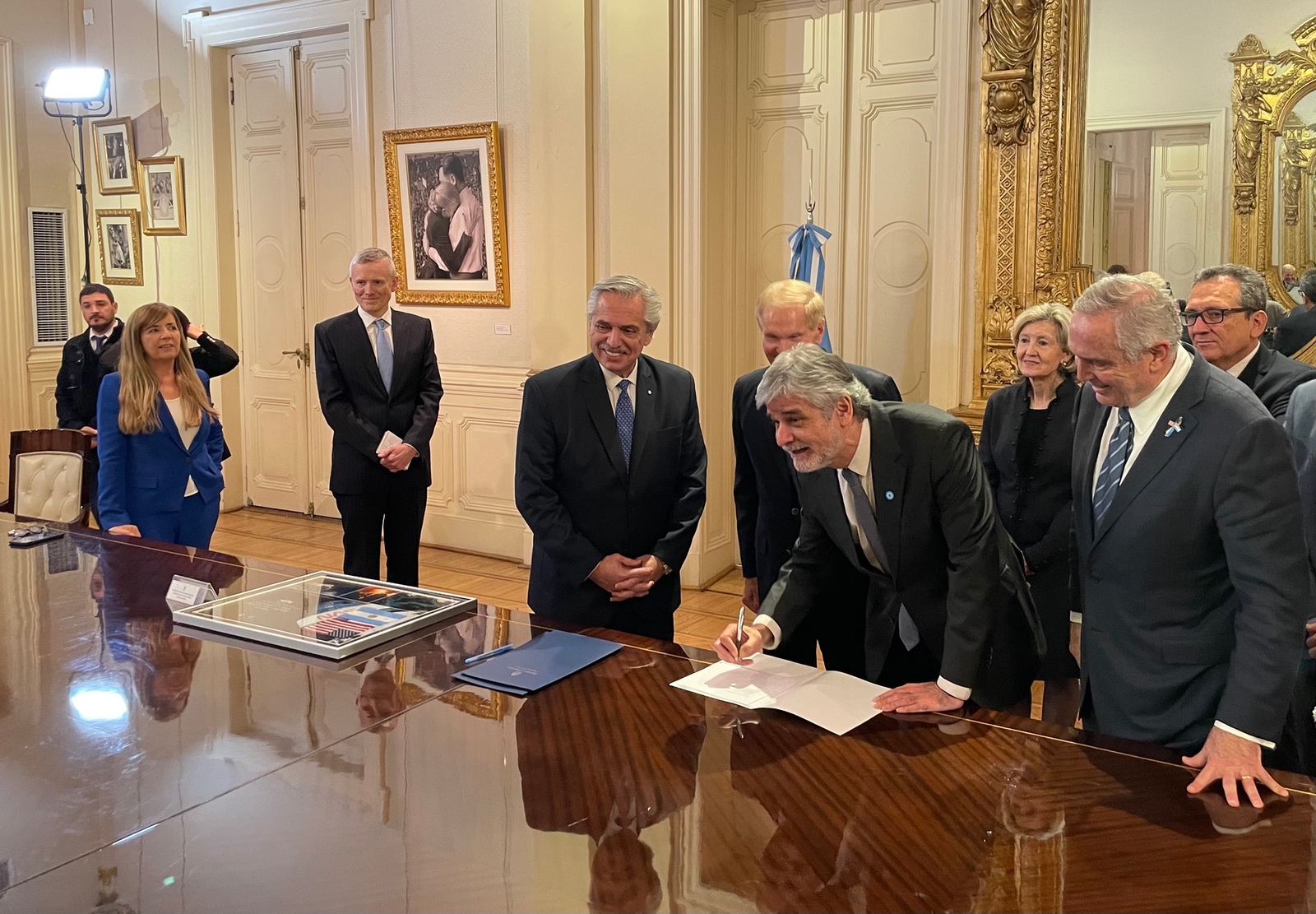WASHINGTON — Argentina signed the U.S.-led Artemis Accords outlining best practices for space exploration, part of a recent surge of countries joining the agreement.
Daniel Filmus, Argentina’s minister for science, technology and innovation, signed the Artemis Accords in a ceremony July 27 at Casa Rosada, Argentina’s presidential office in Buenos Aires. Argentine President Alberto Fernández attended the ceremony along with NASA Administrator Bill Nelson.
“Along with our fellow Artemis Accords signatories, the United States and Argentina are setting a standard for 21st century exploration and use of space,” Nelson said in a statement about the signing.
The Accords, rolled out in 2020, outline best practices and norms of behavior for space activities, building upon the Outer Space Treaty and other agreements. They extend to additional topics, such as exchange of scientific data and utilization of space resources.
“We are convinced that the Artemis Accords constitute a contribution to the development of space activities with peaceful purposes at a global level and that they will increase international cooperation with Argentina,” said Filmus in the NASA statement.
Argentina is the 28th country to sign the Accords and the fifth to do so in the last three months. The Czech Republic and Spain signed the document in May, followed by Ecuador and India in June.
“The unprecedented momentum that the Accords are enjoying is a tribute to the global desire for norms of behavior in space,” said Mike Gold, chief growth officer at Redwire and a former NASA official who spearheaded development of the Artemis Accords in 2020. “This is vital not only for government activities, but for the private sector as well, since investors and operators benefit greatly from an environment in space that is peaceful, predictable and prosperous.”
Signing the Accords, though, does not mean a country will be participating in the NASA-led Artemis lunar exploration campaign. “The Accords are how we’re going to operate and it’s really about how we’re going to conduct ourselves when we do the Artemis missions,” said Jim Free, NASA associate administrator for exploration systems development, during a panel discussion at the American Astronautical Society’s Glenn Memorial Symposium July 19. “Folks who sign the Accords are stepping up and saying, ‘Yes, I want to operate in an open, transparent way.’”
Countries that are cooperating on Artemis by providing hardware or expertise, he noted, are handled separately from the Accords though a series of agreements. “What we’re asking everyone to do is to take our objectives, compare them to yours,” he said, to look for areas that align, “and how that plays out to what you can contribute.”
U.S. and Italy to expand space cooperation
While Argentina joined the list of Artemis Accords signatories, one of the first countries to sign the document is expanding its cooperation with the United States in space.
In a July 27 joint statement after a meeting at the White House between President Joe Biden and Italian Prime Minister Giorgia Meloni, the leaders of the two countries said they would work to enhance cooperation between the countries in space.
“The United States and Italy commit to strengthen space cooperation, including through the creation of a ‘new space dialogue’ to promote industrial cooperation with government support,” the document stated. The document did not go into details about that space dialogue and what it will accomplish.
The joint statement noted the countries welcomed “innovative new commercial space partnerships, including to advance human spaceflight,” specifically mentioning commercial space stations. Thales Alenia Space Italia is working with two American companies, Axiom Space and Northrop Grumman, developing commercial space stations.
Three Italians flew as payload specialists on Virgin Galactic’s first commercial SpaceShipTwo suborbital spaceflight in June. One of them, Italian Air Force Col. Walter Villadei, has trained with Axiom Space for a future commercial flight to the International Space Station.
The statement added that the countries “recognize the importance of addressing space threats through norms, rules, and principles of responsible behaviors.” The Italian government announced in April it would not conduct destructive direct-ascent anti-satellite weapons tests, joining an initiative announced by Vice President Kamala Harris a year earlier.
